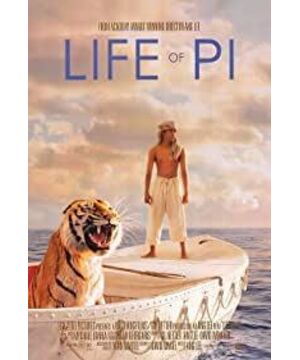In the whole movie theater, the director is telling us stories through π.
A story about religion, belief, destiny, humanity, divinity and bestiality.
What the interviewer French represents is the audience's perspective. Everything before π's shipwreck is a foreshadowing for the subsequent encounter, and the metaphors in the film can be seen everywhere.
When the shipwreck storm came, π ecstatically called for the storm to be stronger, and performed the dance of Shiva on one foot. As we all know, Shiva is the god of destruction, and it is also the first religious belief that π met in the prelude. During the drifting after the sea disaster, the shape of π actually underwent several carefully arranged transformations. Because Director Li’s skill is too deep and the excess is too natural, it may be ignored by most audiences. The shape at the beginning of π represents his original He is fragile and pure, such as Hinduism, which believes in polytheism and respects all living beings. This stage culminates when he knocks down the ghost-headed knife that feeds the tiger, and weeps and kneels to Vishnu.
In the second stage, in order to survive, he began to compete with tigers and kill fish, showing an aggressive and ferocious side. At this time, the shape of the turban has an obvious Islamic shape.
In the third stage, it was the storm that destroyed him, and it was also the storm that brought him to the floating island where he regained hope, so π saw the light of the sky and the miracle of lightning in the second storm, here The stage π is disheveled and bony, it is not difficult to recall the image of Jesus, and the floating island appeared after he was calm and thankful to prepare for death, and when π finally reached the Gulf of Mexico to land, the body was lying in the posture of the cross On the beach, and the line also happens to say: "The warm sand is like the cheek of God." It marks that he has achieved his salvation.
Why is Life of Pi a film that truly reflects Chinese culture?
This is because Ang Lee has always been in the blood of Chinese philosophy in expressing the complex issues of various religious beliefs, personal choices, three views, divinity, human nature, and animal nature.
1. Divine unity.
The shape of the human body lying flat appears three times in the movie, the first time is the sleeping position of π's mother. The second time is π thanking Vishnu for bringing him to know the idol worshipped by Jesus Christ, and the third time is the entire shape of the floating island, where the three represented are unified, (π's belief bloodline comes from the mother, while the father It represents relatively harsh atheism and science) that is, no matter which religion it is, the divinity actually has a high degree of intercommunication.
Only those of us who believe in the unity of Confucianism, Buddhism and Taoism, and those who believe in the so-called "absence", can best understand the line of believing in polytheism and at the same time believing in doubt π: "Faith is a room with many rooms. Doubt keeps faith alive." The so-called "moving against the Tao" is also called.
2. Don't demand the truth.
His Royal Highness said: "We are not a nation that likes to seek the truth!" After the viewing, most of the discussions revolved around which story is the truth. I feel that this is contrary to the director's intention. It doesn't matter whether you believe in God or science. The director buried many unreasonable "loopholes" in the first story narrated by π. These hints continued from the experience of feeding tigers as a child narrated by π to the end of the shipwreck story, telling us how subjective memory itself is. , and the story still left many unsolved mysteries until the end, such as the real reason for the sinking of the ship, the departure of the tiger, the origin of the tiger's name (there is no logical relationship between thirsty and Richard Parker in English) and the truth of the story. "Why is the lotus hidden in the forest?" The answer to everything is as mysterious as the tooth, both good and bad. After the first story was told, the French said, "I don't know how to think, there are too many to digest, and there are too many unclear meanings", which represents the audience's mentality and questions, and the director also answered us through adult π "What happened is what happened, must it have any meaning?" We don't get to the bottom of the truth, we only care about the beauty of the lotus blooming in the forest.
3. The whole story of yin and yang chaos
does not seem to have a clear theme. Some people have subjective beliefs, some gods wait and see, and at the same time, there is also the cruelty of "heaven and earth don't see all things as cud dogs". Everything is uncertain and everything is in chaos. changing each other.
4. Euphemism
The first, of course, is π, the scientific and Zen-like name for an infinite loop.
I thought that the tiger was actually π himself (the illusion of two people entering the sea at the same time under the moonlight is the most obvious sign), not limited to the simple symbol of the connection between the two stories, but in the story told by π, π itself is a divinity, The combination of human nature and animal nature, while the tiger symbolizes the natural attributes of him. Starting from his father's idealized trauma of strangling him when he was young, the tiger has become the opposite of π, and then in the process of shipwreck and drifting, π and tiger are at odds with each other. , struggle with each other and depend on each other. π disciplines and conquers it, until the end of life, when the two become one. π said that in the end, the tiger's leaving without telling him confirmed his father's words "he is a beast, not your friend", and what I feel is not the objective difference between humans and animals, but that humans should not regard animals as wishful thinking. Treat people. Also as π said, the soul of the tiger he felt, and his desire to express his emotions for the tiger, just revealed the theme of the film: the world may be objectively "unkind", and human nature is complex and unpredictable. , but we can still embrace faith, memory, imagination, and love, keep saying goodbye to letting go, and keep walking.
PS: Director Ang Lee deserves to be Director Ang Lee! Such a complex and abstract subject can be photographed with such appropriate depths and depths, and the vision and courage of discovering newcomers is as sharp as discovering Tang Wei! ! ! And the wonderful conversion of the lens in various viewing angles! ! ! Hats off to this! ! !
View more about Life of Pi reviews











